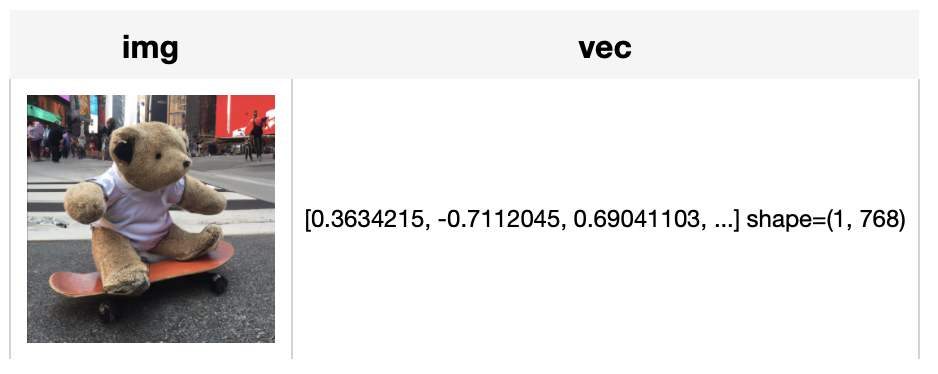# Image-Text Retrieval Embdding with LightningDOT
*author: David Wang*
## Description
This operator extracts features for image or text with [LightningDOT](https://arxiv.org/abs/2103.08784) which can generate embeddings for text and image by jointly training an image encoder and text encoder to maximize the cosine similarity.
## Code Example
Load an image from path './teddy.jpg' to generate an image embedding.
Read the text 'A teddybear on a skateboard in Times Square.' to generate an text embedding.
*Write a pipeline with explicit inputs/outputs name specifications:*
```python
from towhee import pipe, ops, DataCollection
img_pipe = (
pipe.input('url')
.map('url', 'img', ops.image_decode.cv2_rgb())
.map('img', 'vec', ops.image_text_embedding.lightningdot(model_name='lightningdot_base', modality='image'))
.output('img', 'vec')
)
text_pipe = (
pipe.input('text')
.map('text', 'vec', ops.image_text_embedding.lightningdot(model_name='lightningdot_base', modality='text'))
.output('text', 'vec')
)
DataCollection(img_pipe('./teddy.jpg')).show()
DataCollection(text_pipe('A teddybear on a skateboard in Times Square.')).show()
```


## Factory Constructor
Create the operator via the following factory method
***lightningdot(model_name, modality)***
**Parameters:**
***model_name:*** *str*
The model name of LightningDOT. Supported model names:
- lightningdot_base
- lightningdot_coco_ft
- lightningdot_flickr_ft
***modality:*** *str*
Which modality(*image* or *text*) is used to generate the embedding.
## Interface
An image-text embedding operator takes a [towhee image](link/to/towhee/image/api/doc) or string as input and generate an embedding in ndarray.
**Parameters:**
***data:*** *towhee.types.Image (a sub-class of numpy.ndarray)* or *str*
The data (image or text based on specified modality) to generate embedding.
**Returns:** *numpy.ndarray*
The data embedding extracted by model.
# More Resources
- [Sparse and Dense Embeddings - Zilliz blog](https://zilliz.com/learn/sparse-and-dense-embeddings): Learn about sparse and dense embeddings, their use cases, and a text classification example using these embeddings.
- [Building A Trademark Image Search System with Milvus - Zilliz blog](https://zilliz.com/learn/image-based-trademark-similarity-search-system): Learn how to use a vector database to build your own trademark image similarity search system that could save you from intellectual property lawsuits.
- [Training Your Own Text Embedding Model - Zilliz blog](https://zilliz.com/learn/training-your-own-text-embedding-model): Explore how to train your text embedding model using the `sentence-transformers` library and generate our training data by leveraging a pre-trained LLM.
- [Supercharged Semantic Similarity Search in Production - Zilliz blog](https://zilliz.com/learn/supercharged-semantic-similarity-search-in-production): Building a Blazing Fast, Highly Scalable Text-to-Image Search with CLIP embeddings and Milvus, the most advanced open-source vector database.
- [An LLM Powered Text to Image Prompt Generation with Milvus - Zilliz blog](https://zilliz.com/blog/llm-powered-text-to-image-prompt-generation-with-milvus): An interesting LLM project powered by the Milvus vector database for generating more efficient text-to-image prompts.
- [Hybrid Search: Combining Text and Image for Enhanced Search Capabilities - Zilliz blog](https://zilliz.com/learn/hybrid-search-combining-text-and-image): Milvus enables hybrid sparse and dense vector search and multi-vector search capabilities, simplifying the vectorization and search process.
- [Build a Multimodal Search System with Milvus - Zilliz blog](https://zilliz.com/blog/how-vector-dbs-are-revolutionizing-unstructured-data-search-ai-applications): Implementing a Multimodal Similarity Search System Using Milvus, Radient, ImageBind, and Meta-Chameleon-7b
- [Image Embeddings for Enhanced Image Search - Zilliz blog](https://zilliz.com/learn/image-embeddings-for-enhanced-image-search): Image Embeddings are the core of modern computer vision algorithms. Understand their implementation and use cases and explore different image embedding models.
